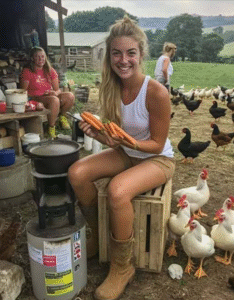Some people hear the words “farmer’s daughter” and make assumptions before they ever hear my story. They picture a girl with mud on her boots, hay in her hair, and no ambitions beyond a fence line. They imagine someone small-town, simple, unworldly—a life measured only in acres and chores.
What they don’t know is that being a farmer’s daughter didn’t make me less. It made me more.
Growing Up Where Work Starts Before Sunrise
My childhood wasn’t the kind where you slept in on weekends. Our mornings began with the sound of the barn door sliding open, the hum of tractors warming up, the muffled snorts of animals waiting for feed.
Before I understood multiplication, I understood responsibility. Before I learned to tie my shoes, I learned to hold a baby goat still while my father checked its temperature. I carried buckets half my height, shoveled snow off the barn roof, bottle-fed calves, and rode in the passenger seat of a combine long before I could reach the pedals.
Some kids grew up with cartoons. I grew up with seasons. Winter meant mending fences. Spring meant planting. Summer meant long, hot days in fields that shimmered in the sun. Fall meant harvest—the rush, the pride, the relief.
That rhythm—steady, demanding, beautiful—taught me discipline before any classroom did.
The Comments I Never Forgot
But outside the farm, people treated my world like a punchline.
“You’re a farmer’s daughter? So… like, do you even know what real life is like?”
“Bet you can’t wait to escape that boring place.”
“Oh, you must not get out much.”
“You probably don’t know anything about college.”
“Don’t farmers just… work with cows?”
It was strange how people could reduce an entire identity—an entire industry—to something they dismissed without understanding. They didn’t see the nights my father stayed up worrying about the weather forecast, or the way my mother kept detailed budgets that would put some business owners to shame.
They didn’t know we were economists, biologists, veterinarians, mechanics, environmental scientists, and entrepreneurs—all in one family.
But to them? I was just a farmer’s daughter, as if that meant I didn’t belong in their conversations or their dreams.
What They Didn’t Know
They didn’t know that farming is science.
It’s soil chemistry, crop rotation strategies, pest management plans, and machinery maintenance.
They didn’t know farming is math.
When you’re calculating feed ratios, harvest yields, fertilizer costs, and unpredictable economic swings, numbers matter more than most people realize.
They didn’t know farming is business.
Contracts, markets, loans, supply chains, risk assessment—farming isn’t just physical labor; it’s a lifetime of high-stakes decision-making.
And they didn’t know farming is heart.
Because when you help bring life into the world, when you watch storms wipe out fields you worked months for, when you put everything you have—body, mind, spirit—into land that may or may not repay you… you learn resilience in a way few ever experience.
Carrying the Farm With Me Into the World
When I left home for college, people assumed I’d be naïve or unprepared. Instead, I arrived more grounded than most of my classmates. I knew how to wake up early without complaint. I knew how to solve problems without panicking. I knew what failure felt like, and that it wasn’t fatal.
While others worried about the pressure of grades, I had grown up with real-world stakes—weather patterns, crop health, and livestock well-being. I knew how to handle responsibility, because responsibility was not new to me. It had been built into my life since childhood.
I majored in a field no one expected—something technical, something people said “didn’t fit” a girl from a farm. But I excelled, not in spite of my upbringing, but because of it. The work ethic I learned on the farm was a superpower in lecture halls and labs.
The World’s Blind Spots
Sometimes people still make comments.
“Oh, you grew up on a farm? You must have been sheltered.”
“You’re so sophisticated—I wouldn’t have guessed.”
“You don’t look like a farm girl.”
As if the farm is small.
As if the farm is backwards.
As if the farm produces less intelligence, less culture, less potential.
But the truth is, the farm gave me more exposure to life than many people from cities ever get. I saw birth, death, sacrifice, survival, scarcity, abundance—raw and unfiltered. I learned the value of food, of land, of labor. I learned that nature doesn’t bend to your schedule, and dreams require effort, not entitlement.
The Moments That Shaped Me
I remember the first time I helped deliver a breech calf. My arms shook; I was terrified. My father looked at me with calm confidence and said, “You can do this.” And I did. That night, I learned what it meant to step up when something depended on you.
I remember the day a storm destroyed half our crops. My mother stood at the window, silent, her face unreadable. Then she turned around, rolled up her sleeves, and said, “We’ll figure it out.” From her, I learned grace in the face of loss.
I remember neighbors showing up with casseroles when our tractor broke in the middle of harvest. Community, where people help without being asked—that’s something you can’t buy, can’t fake, can’t replace.
All those lessons built me.
Reclaiming the Title
So yes, I’m a farmer’s daughter.
But here’s what that really means:
It means I know the value of hard work.
It means I know how to keep going when things get tough.
It means I come from people who produce food for millions but rarely get recognition for it.
It means I carry the legacy of generations who lived close to the earth and understood its language.
It means I’m not afraid of dirt, or sweat, or challenges that look too big from the outside.
It means I am grounded.
It means I am capable.
It means I am enough—and then some.
The Truth I Stand On
Some people still think being a farmer’s daughter makes me less.
Less worldly.
Less sophisticated.
Less ambitious.
Less educated.
But the truth is, it made me more resilient than most.
More determined.
More appreciative.
More connected.
More human.
I wouldn’t trade my roots for anything.
Because the farm didn’t limit me—
it built me.


